When deciding what kind of milk is best for your body, you may want to consider fortification. Fortified dairy and plant-based milk can give your body the necessary vitamins and minerals to function properly, especially if you don’t get these nutrients from other sources in your diet.
Learn more about milk fortification, including common nutrients put into cow’s and alternative milk, and the pros and cons of drinking fortified products. This information can help you decide which milk option is right for you.
What is Fortified Milk?
Milk fortification is when manufacturers add nutrients like vitamins or minerals to a milk product to enhance its nutritional value.
Sometimes this means adding nutrients that are only available in small amounts in the natural product. It can also mean adding nutrients not found within the milk’s natural nutritional profile.
Many dairy companies fortify cow milk products with Vitamin D and Vitamin A to help with calcium absorption.
Alternative milk manufacturers add Calcium, Vitamin D, and other minerals to plant milk since they don’t naturally contain high amounts of these essential nutrients.
For most fortification processes, manufacturers add a synthetic version of the nutrient to the product.
In the U.S., these food additives are approved by the FDA up to specific amounts. For example, up to 84 IU per 100g of vitamin D3 in dairy milk and up to 84 IU per 100g of vitamin D2 in plant-based milk.
In most cases, you can tell if milk is fortified by looking at the label or ingredients. Many companies will put phrases like "With Calcium" or other nutrients, which generally means it's fortified.
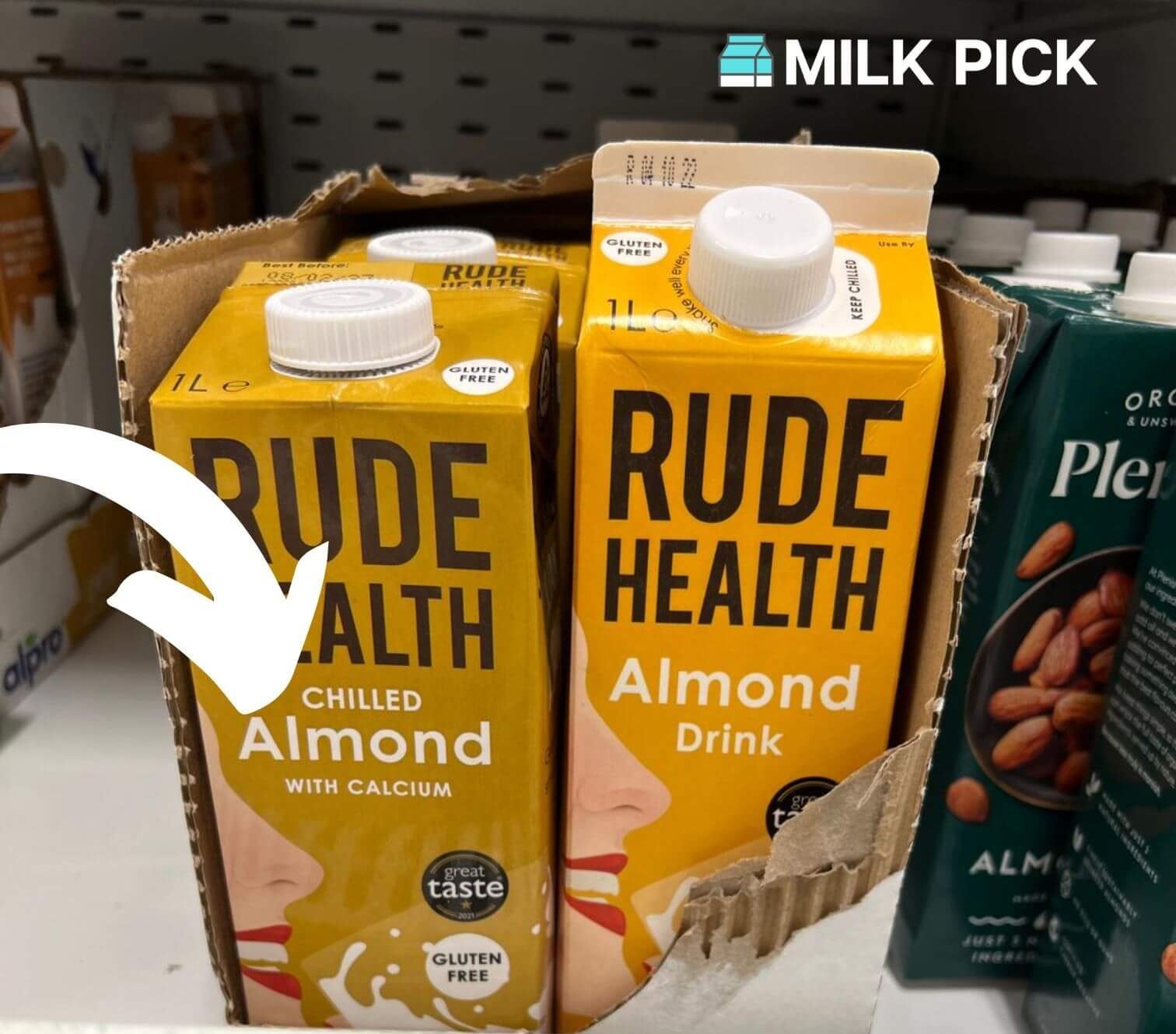
Why Do Milk Companies Fortify Their Products?
Milk companies fortify their products for several reasons.
First and foremost, they add nutrients to their products to boost their nutritional value. Up to 90% of U.S. adults lack some form of mineral or nutrient in their diets,
Although fortification isn’t required by law in the U.S., most companies include nutrients to help keep consumers healthy and market their products.
Many processed foods lose their natural nutrients during the manufacturing process.
For example, most milk goes through pasteurization which heats the beverage to at least 161° F, which breaks down vitamins and minerals.
Adding nutrients back in is a relatively affordable way to get the needed minerals and vitamins back into the product and helps companies compete with other food manufacturers.
Common Nutrients Used in Fortified Milk
The nutrients companies use to fortify their milk products vary based on the product and geographical location.
For example, milk in other parts of the world may be fortified with B Vitamins and Zinc, but milk in the U.S. is usually fortified with Vitamins A and D.
The following are the Recommended Dietary Intakes (RDIs) for common nutrients used to fortify dairy milk and plant milk:
Note that fortification typically provides between 1% and around 25% of your RDI per serving, but it will vary based on the product
Vitamin A - RDI 900 μg
Vitamin A is a nutrient that helps your body with immunity, vision, and growth. It has antioxidant properties that help your cells fight free radicals, which are thought to play a part in the development of cancer and heart disease.
While you can get Vitamin A in foods like spinach and carrots, it can be hard to get the recommended amount. Many milk companies add Vitamin A to their product as a way to supplement this vitamin.
Vitamin E - RDI 15 mg
Vitamin E, also listed as tocopherol, is a fat-soluble vitamin that helps protect your body against harmful free radicals.
This nutrient boosts immunity and helps you fight off sickness caused by viruses and bacteria.
Many milk companies fortify their products with tocopherol acetate, a synthetic form of Vitamin E. Some alternative milk manufacturers add oils high in Vitamin E, such as sunflower oil, to boost the nutrient level in their products.
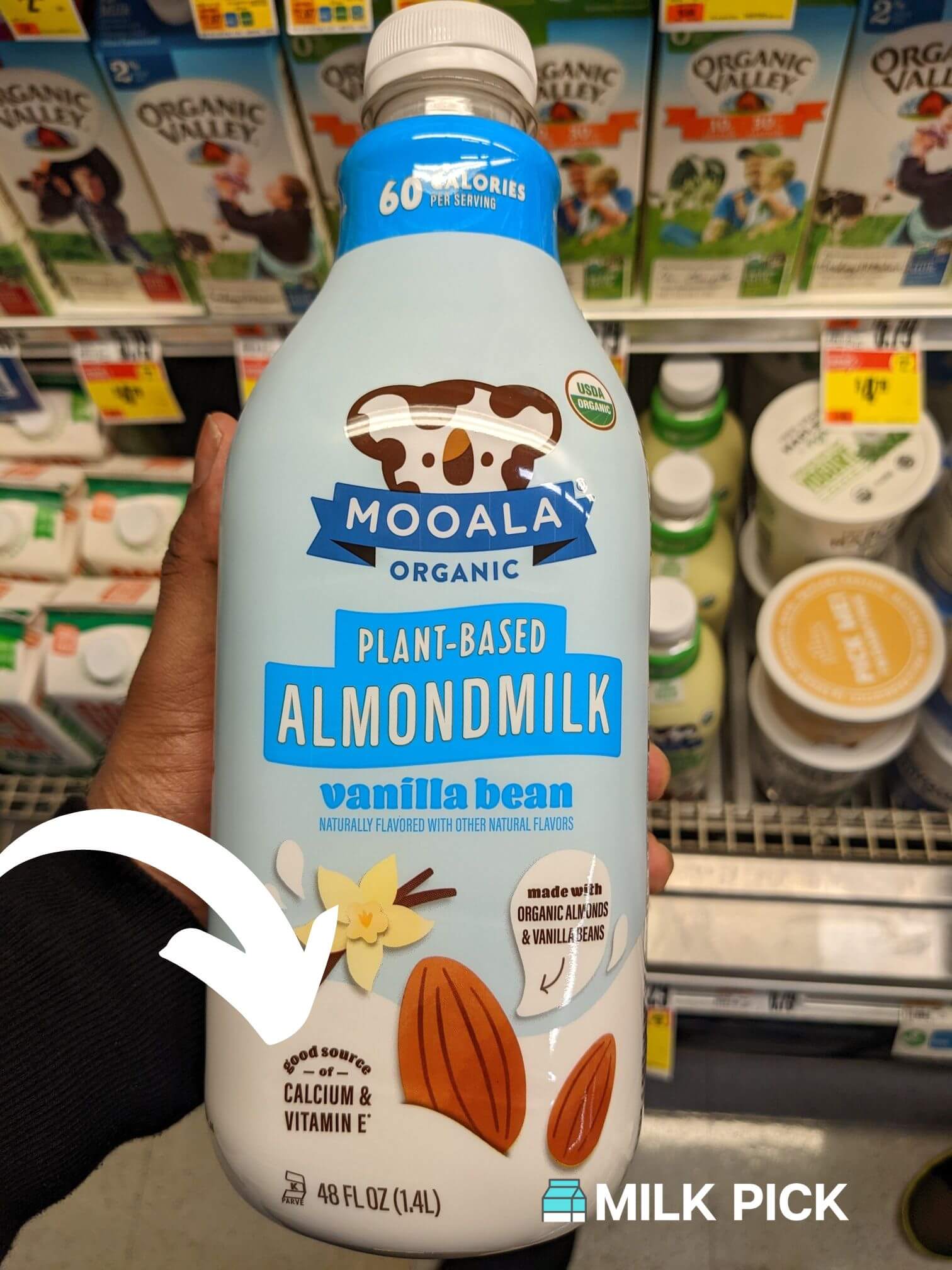
Vitamin C - RDI 90 mg
Vitamin C, which can also be labeled as ascorbic acid, helps your body form cartilage, collagen, blood vessels, and muscle. It also supports healthy immune system functioning.
The nutrient aids your body in absorbing and storing iron and has antioxidant properties that help fight against disease.
Your body can’t produce Vitamin C on its own, so you must get it from the food you eat. These foods include citrus fruits, potatoes, and peppers, but you may also get Vitamin C from drinking fortified milk.
Vitamin D - RDI 20 μg
Vitamin D is a necessary vitamin that our body needs to absorb and retain phosphorus and calcium. These nutrients are necessary to build healthy, strong bones and maintain bone density throughout your life.
Vitamin D is also a hormone our body can make from sunlight - however, most people in the U.S. lack enough Vitamin D from diet alone.
Milk companies fortify their beverages with Vitamin D, typically with a synthetic form of Vitamin D3 called cholecalciferol.
This helps ensure that people get enough of this essential nutrient and can obtain and use calcium naturally found in cow’s milk and plant milk, like almond milk.
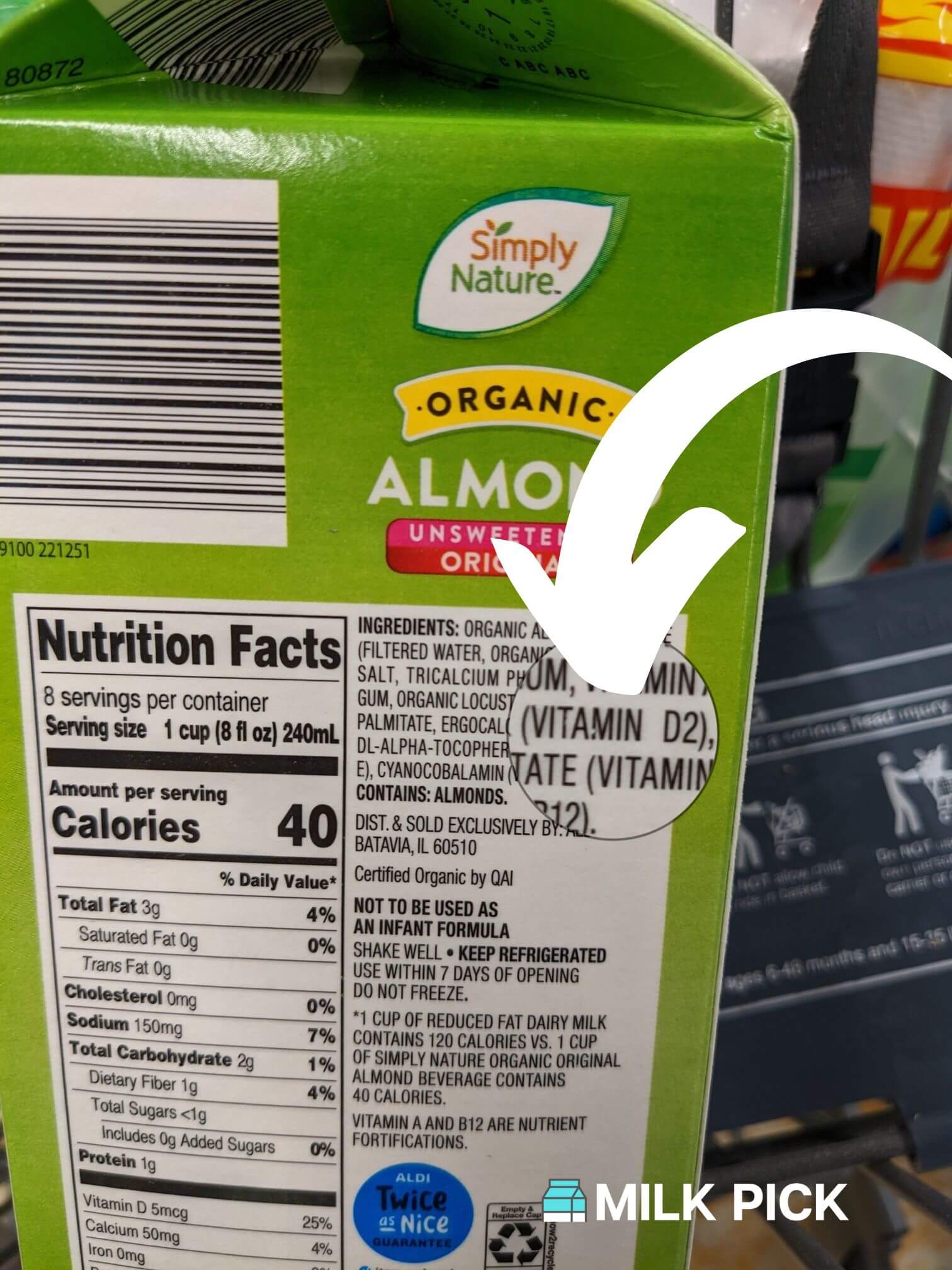
Calcium - RDI 1300 mg
Along with Vitamin D, calcium is essential for bone health. It also helps regulate heart health and nerve functioning.
You can get calcium naturally from many foods, like beans, lentils, cheeses, yogurt, and almonds, but many milk companies also fortify their product with calcium.
Fortified calcium may appear as calcium chloride, calcium carbonate, or calcium citrate on the nutrition label of alternative milk or dairy milk.
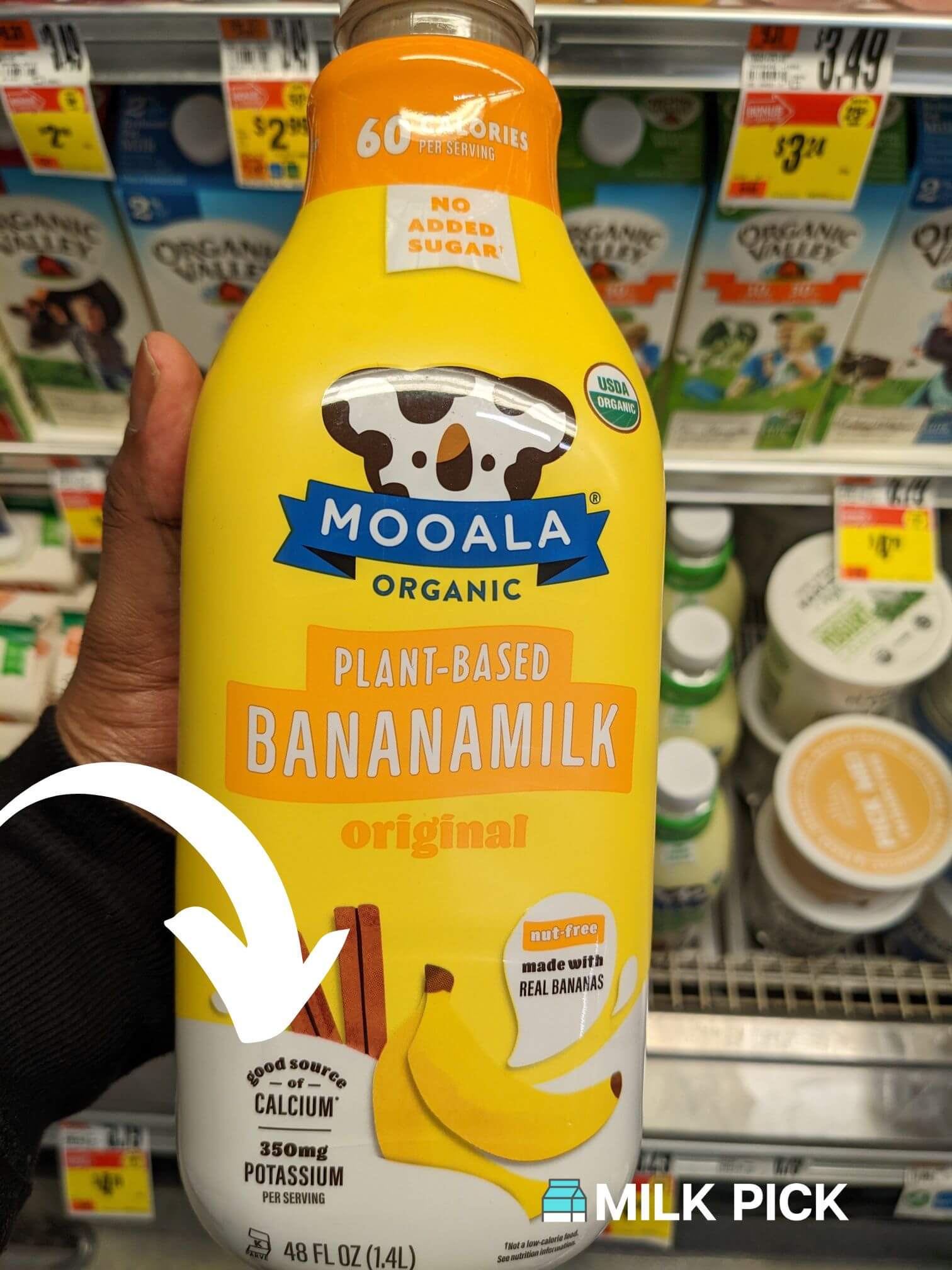
Pros of Fortifying Milk
Milk fortification offers many benefits for people who don’t get enough essential nutrients in their diet.
Fortified plant milk or cow’s milk can fill nutrient gaps, support growing children’s bodies, and keep bones healthy with nutrients that are hard to get through diet alone.
Helps Fill In Nutrient Gaps
The primary purpose of fortification is to add or reintroduce nutrients into the product. Until the early 20th century, many people in the U.S. suffered from conditions caused by nutrient deficiency.
For example, many people developed rickets (caused by lack of Vitamin D), scurvy (caused by lack of Vitamin C), and hypocalcemia (low calcium levels, which can be caused by lack of Vitamin D).
Diseases like these have been significantly reduced in developed countries since fortification became routine in the mid-1900s.
People can get what their body needs without worrying about nutrient deficiency when companies put nutrients, such as Vitamin D, Folic Acid, and calcium, into plant-based milk like almond milk.
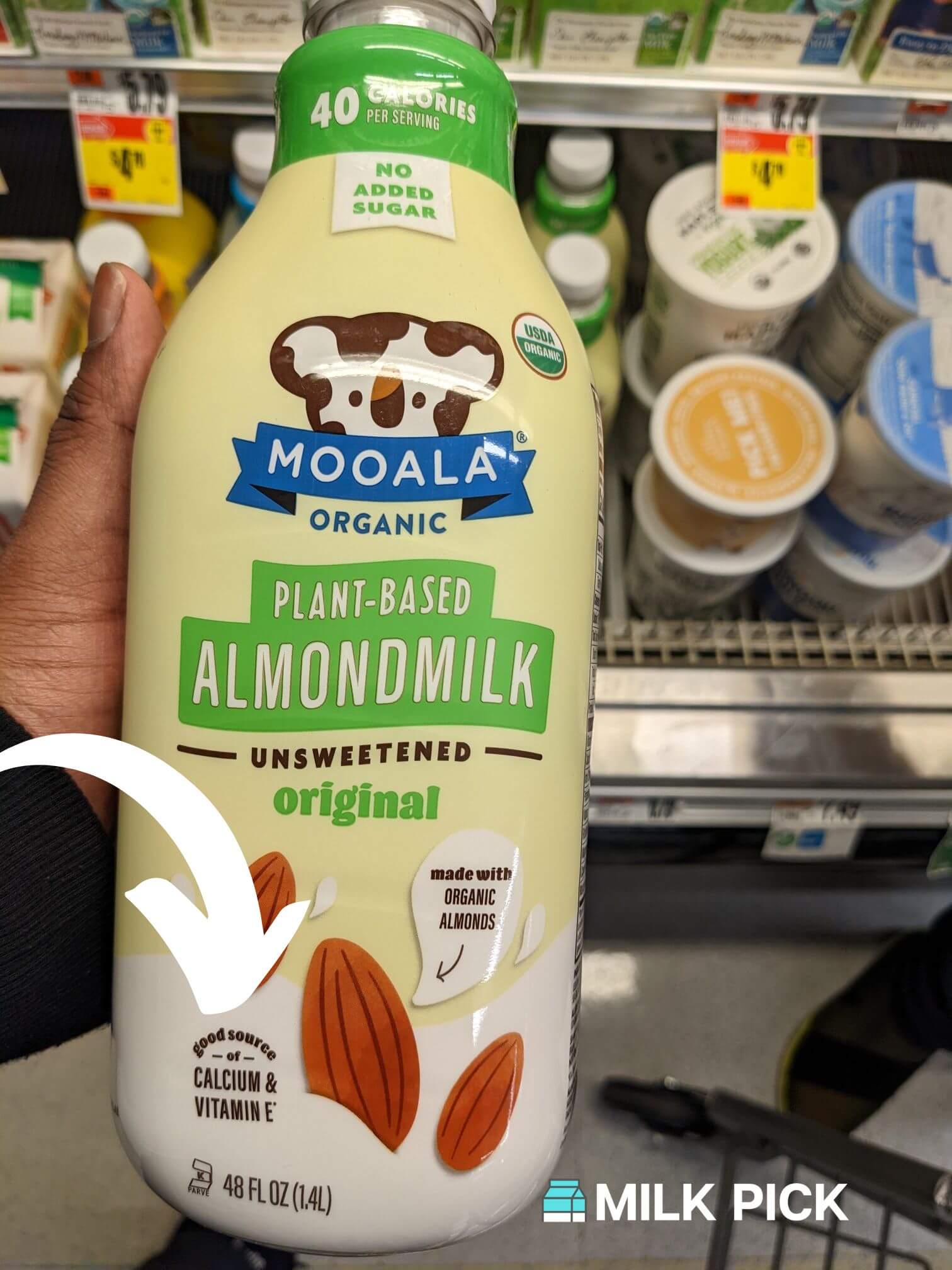
Beneficial For Children’s Growth
More than adults, children must have the right nutrients for their bodies to grow normally.
Kids are especially susceptible to conditions like anemia (low iron) and Vitamin D deficiency, which can interfere with bone growth and overall health.
Milk fortified with nutrients like Vitamins D, C, and A helps ensure children consume enough of these substances to grow strong, healthy bones. Magnesium, protein, and B Vitamins also play a part in helping children grow.
While cow’s milk naturally contains many of these nutrients, plant milk may not have them in high levels.
Some research may suggest that children who drink plant milk don’t grow as tall as those who drink dairy milk, likely due to the lack of calcium, protein, and Vitamin D that is not present in raw or non-fortified alternative milk.
While the study may indicate that non-fortified plant milk hinders growth, it did not explicitly state that the plant milk caused the children to measure at a shorter height.
However, it may indicate that dairy or fortified plant milk is a better option for children.
If you prefer non-fortified plant-based milk, you can choose another option with higher natural calcium levels, such as Kiki milk.
Are There Any Cons To Fortified Milk?
While there are several benefits to drinking fortified milk, there are a few potential downsides.
Since it can be challenging to find products that are not fortified, some people may end up over-consuming certain vitamins or minerals, especially if they already take supplements.
For example, consuming too much Vitamin A can cause dizziness or nausea. Additionally, too much calcium can cause hypercalcemia, leading to kidney stones and weakened bones.
A secondary concern may be the recommended daily allowances (RDAs) offered by the FDA. First introduced in 1968, current guidelines (changed to reference daily intake (RDI) or daily value (DV)) were only just updated in 2016.
The process for changing RDIs is slow. Although recommendations are based on scientific evidence, by the time your product or label is up-to-date with current knowledge, you may be getting too much or too little nutrients in the meantime.
While it’s highly unlikely that you’d develop dietary issues from drinking fortified plant milk, it is an issue to be aware of if you regularly consume foods with added nutrients.
One final note is that some people confuse fortification with “healthy.” While fortification can help you maintain healthy levels of nutrients, it doesn’t mean a product is good for you.
For example, flavored almond milk may be fortified with Vitamin D and calcium while also containing harmful sugars and additives.
Also, fortified nutrients are mostly synthetic, so they may not be as effective for your body as those found in natural, bioavailable forms from whole foods.
For instance, organic almond milk like Three Trees may only contain 6% of your RDI of calcium and 2% RDI of potassium; however, since these nutrients come from organic, raw almonds, your body can use them more efficiently.
Choose The Right Milk Option For Your Dietary Needs
Every person has a unique chemical makeup that informs their dietary needs. While fortification has both pros and cons, it's important that you understand your body’s needs when choosing a milk or alternative milk beverage.
Consider tracking your daily nutrient intake in an app like MyFitnessPal or Lifesum to see where you may fall short on certain vitamins and minerals. Remember to track any supplements you take and the food you eat.
Once you have a complete picture of your nutrient intake, you can better understand how your milk of choice fits into your overall dietary picture and make the right choice for you.
